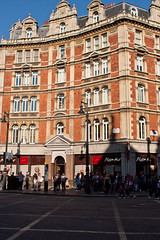Sharp wit and sharp weapons
Country of the Blind
by Christopher Brookmyre
This book is just right if you have a day free to do nothing but read – whether it’s a restful holiday or a rainy Sunday. The plot is thick and fast and the language fun but also sharp-edged. Brookmyre always picks a clear target in his novels, a dartboard to throw poison arrows at, and in this case it’s the Tory Party, so I was happy.
In fairness there is a scene early on in which a wise (Tory) father advises his youthful (liberal) daughter not to assume that all members of the widely hated party are monsters, quoting Orwell’s Two Minute Hate. When said character advocates more discourse and exchanging of ideas, I had to wonder what Brookmyre thinks of the current UK coalition government. But I digress…
Like all Brookmyre’s novels (at least all those I’ve read, which is a lot of them) this is crime fiction written with vicious humour and some very interesting lead characters, a number of whom feature in his other books. Lead character is investigative journalist Jack Parlabane (in his second outing, because I read this out of sequence) who is about to get married and is therefore earnestly trying to give up his former tendency to get involved in very dangerous things, things that tend to get even more dangerous when he throws himself into the mix. And when he sees the initial reports about the murder of billionaire media mogul (and Tory backer) Roland Voss, Parlabane is more than happy to stay out of it. The police already have the four suspects behind bars, after all. However, the clues soon start piling up that all is not what it seems and Parlabane inevitably gets involved, only to discover that it goes deeper than even he had suspected.
Good crime fiction doesn’t rely on good writing and for every well worded witticism here there’s an unnecessary repetition or an overemphasis that grates a little. I also tend to struggle a little at first with the dialect, as Brookmyre favours setting his novels in his native Glasgow. Not that the entire book is written in dialect, but there’s a lot of speech. Another bugbear I have is Brookmyre’s habit of opening a chapter with the end or middle of a scene, and then going back to how it started, which is interesting (if confusing) once or twice but several times is tedious.
Those reservations aside, I’ll admit that I’m a fan. This is no whodunnit – the who is revealed fairly early on and the how not long afterward. The race to the finish is about whether Parlabane will figure it out and find a way to prove it before too many innocent people die. He doesn’t work alone, of course. His insider in the police, DS Jenny Dalziel, is underused in this story – I seem to remember she had a bigger role in Quite Ugly One Morning – but there’s so many other characters that this is forgiveable.
Parlabane is the classic loveable rogue, with an air of 007 about him. He bends rules left, right and centre but he gets away with it because he is without doubt the good guy and I can’t remember the character ever doing something that I personally disapproved of (unlike Bond).
The book is steeped in references to current affairs and culture and as such I’m not sure how well it will age. Reading this 13 years after publication is one thing – I can well remember the growing frustration at years of Tory government and the hopes for the 1997 election, even if I wasn’t quite old enough to vote yet – but give it a little more time and there may be one too many references to politicians already forgotten.
The other thing that dates this book was something I particularly liked about it: the modernisation of the newsroom. The 1990s saw the end of handmade layouts in favour of DTP software – something I’m more than a little familiar with – and it was with great interest I read the rants of the news editor about the unreliable output from the computer, and about the switch from huge artboards to the now-ubiquitous Mac. It was a minor detail really, but it was one of the things that can make all the difference, allowing you to trust that the author does at least some research – a vital necessity in crime fiction, I would argue.
This really is a fun, well plotted adventure that keeps you reading without relying on unexpected twists or manufactured countdowns. It sat on my to-read shelf for far too long but I suspect that the next one won’t have so much dust gathered on it.
Published 1997 by Little, Brown.
